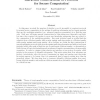145 search results - page 15 / 29 » Adversarial learning |
121
Voted
EUROCRYPT
1999
Springer
15 years 7 months ago
1999
Springer
We consider the problem of basing Oblivious Transfer (OT) and Bit Commitment (BC), with information theoretic security, on seemingly weaker primitives. We introduce a general model...
141
click to vote
SIAMCOMP
2011
14 years 9 months ago
2011
In this paper, we study the question of whether or not it is possible to construct protocols for general secure computation in the setting of malicious adversaries and no honest m...
147
click to vote
PET
2005
Springer
15 years 8 months ago
2005
Springer
Parallel mixing [7] is a technique for optimizing the latency of a synchronous re-encryption mix network. We analyze the anonymity of this technique when an adversary can learn the...
110
click to vote
TCC
2010
Springer
15 years 11 months ago
2010
Springer
We construct public-key cryptosystems that remain secure even when the adversary is given any computationally uninvertible function of the secret key as auxiliary input (even one t...
112
Voted
AAAI
2006
15 years 4 months ago
2006
Many learning tasks in adversarial domains tend to be highly dependent on the opponent. Predefined strategies optimized for play against a specific opponent are not likely to succ...



